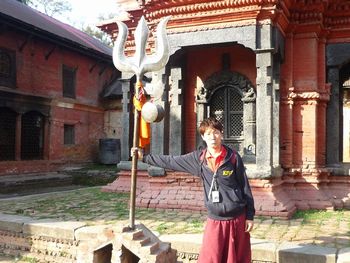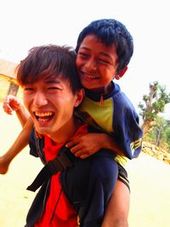Message from representatives:

How do you do!!
I am Toshiaki Kizawa, serving as the fourth representative of International Cooperation Student Organization KIVO.
In short, the goal of our various activities can be explained in just four words: “Books for the World”. Therefore, even though we are now sending books to a small village in Nepal, our activities will go on until we are able to send books all over the world.
I would like to begin my greeting by explaining the ideas and reasons behind the act of sending books.
Why do we send “books”?
There are mainly two reasons.
The first reason is that a book is something that remains in the long run.
We, students have a limit in both time and money. Therefore, when we searched for ways to carry out what is called, “international cooperation” under such circumstances, we thought about what we could do as university students. Sending books was the conclusion we had reached.
This is because books are very familiar and cheap for students. Moreover, acknowledging the fact that we can only stay overseas during the long-term vacations of summer, winter, and spring, we realized that no matter how hard we send medical supplies and food for instance, those would decrease and eventually disappear during our absence. However, a book will remain.
I believe that it is important to offer sustainable support. Temporary support is meaningless for all it builds is our self-satisfaction. Therefore, we chose to send books to avoid the fear of temporary support, which has a bad effect on the receiving-side.
The second reason is the countless possibilities offered within the pages of a book.
Gaikhur, a village in Nepal, where we send books every year, is a very limited community. There, people can only interact with 20 neighbors a day.
When we ask the children about their future dreams, they all repeat the same dreams of becoming a teacher, doctor, or soldier. I felt that the children lacked inspiration and opportunities to choose their own path. Therefore, I wish to encourage Nepalese children to read more and more books for books enhance and widen one’s own sense of value. I also hope that they will find what they truly want to do through the process of reading books.
Some may say that we are only offering inspiration, and a wider range of choices. However, this is what KIVO is all about. The support we offer is not demanding, nor does the effect show immediately. This is what we call “international cooperation”, and having faith in the possibilities, we will continue to send books all around the globe.
Now that I have become the representative, I am beginning to feel the power of KIVO.
“KIVO change one’s life...”
This is our motto.
KIVO has the power to change various things.
For example, looking back at myself, I have changed very much throughout the year.
This year, we have built a library in Nepal, but it was the local people of Nepal who first suggested the project. Unlike the days when KIVO first started to send books to the village in Nepal, the local people have become aware of the power of books as well.
Furthermore, I have seen people change through our activities. Not only was it a member of KIVO, a guest who came to our event, people has been influenced in various areas. Our activities have just begun to influence society. With pride at my heart, I will keep taking action.
Moreover, our activities might be considered to be on a small-scale when compared to those of NPO (Nonprofit Organization) or JICA (Japan International Cooperation Agency). However, if international cooperation can be fulfilled on both a broad and individual level with balance, I believe that it is possible for us to produce much power. We can easily contribute to international cooperation by engaging in activities on an individual level.
Although international cooperation was not something we feel like we can get involved with up until now, I want people to feel that it is something anyone can engage in, if there is a will. If we, as ordinary students, can contribute to international cooperation and show that it is possible for any motivated soul, I believe that that power would open up new doors to the vast possibilities of international cooperation.
Putting value on a single step of a 100 people rather than the 100 steps of a single person - this is what makes it possible for us to make a huge difference.
I hope, as KIVO, that our activities can influence many different societies all around the world.
 |
August 15 2012 Toshiaki Kizawa Fourth Representative of KIVO Sophomore at Nihon University Japan |

Three years have passed since KIVO was founded, and we have finally succeeded in constructing a library in the village of Gaikur, Nepal this year.
“Books for the World.” This is our philosophy, motto, and most importantly, mission.
Thanks to many people who have contributed money and participated in our charity events, we have come this far.
I am most grateful for them.
By offering many books and providing a reading environment, we wish to positively influence the local people and society of Nepal. KIVO aims at more and more development in the field of education.
Before I joined KIVO, I participated in a volunteer activity to support the victims of the Tohoku Earthquake, which struck Japan on March 11th, 2011.
Through this experience, I strongly felt powerless when it comes to the solving of social issues. However, this despairing experience eventually led to a whole new starting point in my life.
It was then, that I met a student organization named KIVO, which held a philosophy: “The power of students is infinite-we aim to influence society with what we can do.”
The idea of practicing international cooperation with what students can do, and only do, while listening to the needs of the local people, gave me a great impression.
Therefore, I also became to strongly feel that I want to carry out volunteer activities searching for what students can do at a maximum, and what only students can do to strongly influence society.
Of course, we students do not have the money or skills to handle professional machines to make a huge change in a short period of time.
However, we have passion and hope. I believe that KIVO provides a good environment in which students can contribute to society, through international cooperation created by international exchange.
Now that we have accomplished many things such as inviting the Nepalese ambassador to our meeting, and hosting a big charity event gathering 300 people, I am certain that no matter how small the power of individuals may be, the power of students has no boundaries once they become one. The power of ambitious students cannot be predicted.
In order to make a positive effect on the lives of the people of Nepal, Japan, and the world, KIVO will never stop, nor will we ever give up.
 |
August 15 2012 Keigo Nakatani Fourth Sub-representative of KIVO Sophomore at Keio University Japan |
